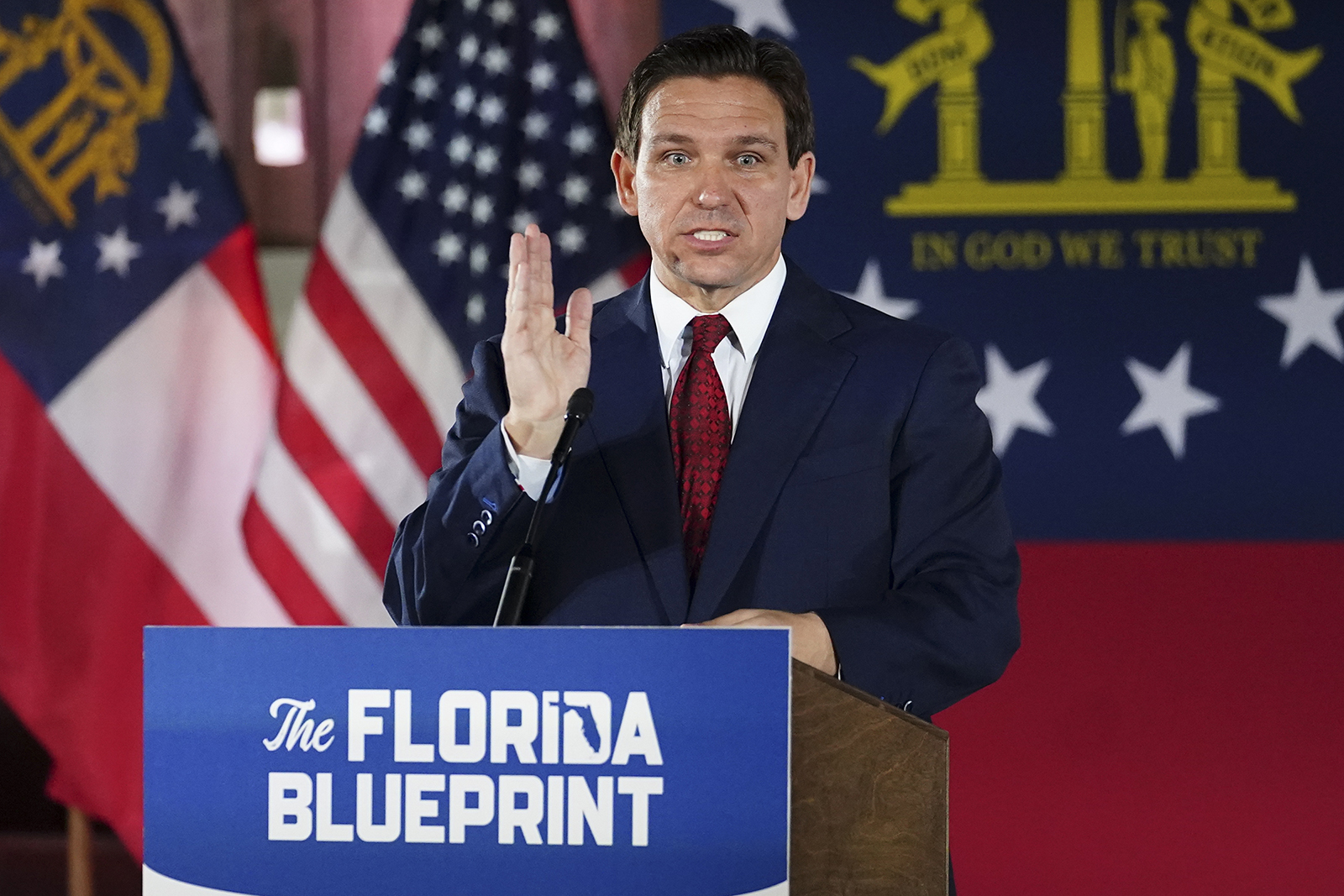
(RNS) — As he moves toward a presidential campaign, Florida Gov. Ron DeSantis is taking high-profile steps to battle progressive ideas in education, a prerequisite for any Republican seeking higher office. But while he and other governors have spoken up for irate conservative parents against their local public school boards or bemoaned wokeness on campus, DeSantis is implanting his own model for higher education in the state of Florida.
He has already disrupted the search for state university presidents, icing out qualified candidates in favor of dead-end Republicans and cronies. Last fall, Sen. Ben Sasse, the Nebraska Republican and occasional Trump critic, resigned his seat to become president of the University of Florida despite protests by the faculty senate, which held that the process was flawed.
DeSantis has reportedly approached Florida lawmaker Randy Fine, who once called a fellow elected official a whore and threatened to defund the Special Olympics, about taking over atop Florida Atlantic University.
But the governor’s most controversial move is his proposed overhaul at New College of Florida, a small state school in Sarasota that has for more than two decades been the state’s public honors college. The Princeton Review calls New College a “a uniquely small and unconventional public institution” where a third of its students are of color and “a fairly strong” LGBTQ community makes for a “coming-out grounds” for transgender people.
In sum, the perfect place for DeSantis to install his vision for America-first Christian education.
In January, DeSantis appointed a new slate of Christian conservatives as trustees for New College, several of whom live outside Florida. They are being rubber-stamped by the Florida Legislature’s Republican supermajority this month.
The move alarmed progressives and advocates for academic freedom and is unprecedented in giving control of a state institution to out-of-state ideologues. If the aim was not clear, administration officials soon said the quiet part out loud.
DeSantis’ chief of staff, James Uthmeier, said, “It is our hope that New College of Florida will become Florida’s classical college more along the lines of a Hillsdale of the South.”
Hillsdale is a private, conservative Christian liberal arts college in Michigan that stands out even among right-wing evangelical institutions for its strident Republicanism, its disregard for fostering racial diversity and its radical distrust of government. (DeSantis also champions efforts to defund diversity, equity and inclusion billets at Florida’s other universities.)

Florida Gov. Ron DeSantis speaks to a crowd at Adventure Outdoors gun store, March 30, 2023, in Smyrna, Georgia. AP Photo/John Bazemore)
Hillsdale’s president, Larry Arnn, sat on former President Donald Trump’s 1776 Commission, dedicated to restoring confidence in America’s founding principles and giving parents and school boards more choice in curriculums.
One such choice is Hillsdale’s 1776 Curriculum, centered on similar values, and which has been adopted by a growing number of taxpayer-funded K-12 schools, often at the urging of GOP governors.
The “Hillsdale of the South” reference was chilling, not only because of the wide gulf between New College’s progressive vibe and Hillsdale’s reactionary white Christian ethos. The real problem is that Hillsdale is a private institution and New College is supported by taxpayer dollars. The former is available to be remade as an ideologically correct training ground; the latter, not.
But as DeSantis is fond of saying, even if he wins 50% or 60% of the vote, he has 100% of the executive power. And with New College, the governor went for the jugular.
Leading the charge is Christopher Rufo, a conservative activist and internet troll who is known primarily for stoking the vogue-ish fear about the supposed evils of critical race theory. While none of the new trustees attended a confirmation hearing in the state Senate, it’s notable that Rufo, who lives in Olympia, Washington, was unavailable because he is on a monthlong junket in Budapest, learning the finer points of ethnoreligious nationalism.
Others on the new board include Ryan Anderson, who lives in Leesburg, Virginia, and heads the Ethics & Public Policy Center, which boasts that it is “Washington, D.C.’s premier institute working to apply the riches of the Judeo-Christian tradition to contemporary questions of law, culture, and politics, in pursuit of America’s continued civic and cultural renewal.”
The center has done good work on pro-family policy and helping the news media to understand religion, but it is ethically diminished of late because its staff and affiliated personnel have apparently been pressured by donors or other sources to keep silent regarding the plain truth about the former president’s incessant degradations, damaging the moral credibly of the entire institution.
Californian Charles Kesler is a professor at Claremont McKenna College and the editor of the Claremont Review of Books, once a resource for conservative moral and political reasoning but now a sad Trumpist echo chamber with an intellectual veneer.
Mark Bauerlein is a retired English professor and Catholic convert and is on the masthead of First Things magazine. Already a consultant to Florida’s K-12 English language arts standards, Bauerlein, a Virginia resident, has lately spoken against DEI efforts in education and affirmative action in publishing. His fellow Virginian Matthew Spalding is a former employee of the right-wing Heritage Foundation who now directs Hillsdale’s Washington program.
None of the new trustees makes any bones about the fact that they have been commissioned to remake New College. Spalding demurred on the “Hillsdale of the South” comparison and said the aim was more modest: “Restoring New College’s ‘distinctive mission’ as the ‘residential liberal arts honors college’ of Florida.” Spalding also envisions students and faculty coming into conversation with “great thinkers and writers who’ve asked timeless questions about human purpose, about the good and justice, and how to live well.”
That doesn’t sound so objectionable, though it’s unclear on the one hand exactly what is undistinctive about New College now and very clear on the other that in the mouths of people like Spalding “how to live well” is aggrieved white Christian code for politically conservative heterosexual conformity.

Jacob Lupfer. Photo by Kit Doyle
Rufo, who boasted that he is “recapturing” higher education, was more plainspoken, telling The New York Times, “We want to provide an alternative for conservative families in the state of Florida to say there is a public university that reflects your values.”
And not only Florida: If DeSantis succeeds, this laboratory of anti-wokeness could become a template for GOP governors across the land.
(Jacob Lupfer is a writer and political analyst in Jacksonville, Florida. The views expressed in this commentary do not necessarily reflect those of Religion News Service.)
